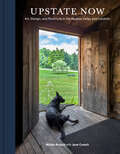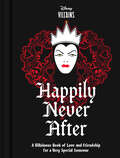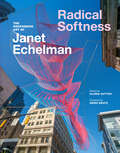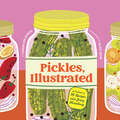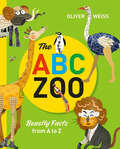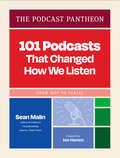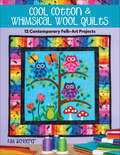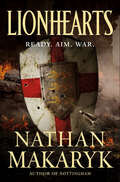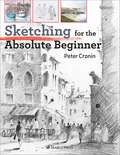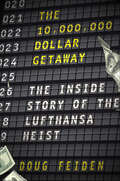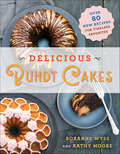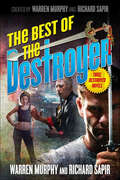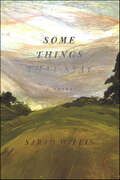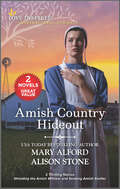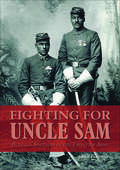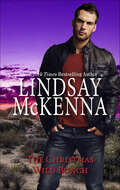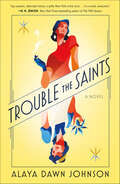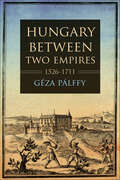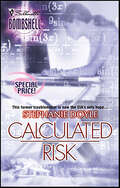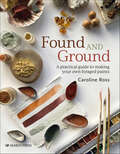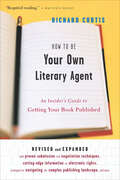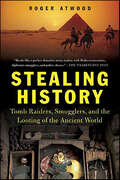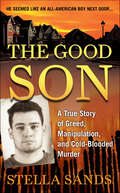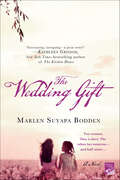- Table View
- List View
Upstate Now: Art, Design, and Rural Life in the Hudson Valley and Catskills
by Michel Arnaud Jane CreechA gorgeous coffee table book rich with photographs and stories about place, community, and living a creative life in the singular world of New York’s Hudson Valley.Today, the Hudson Valley and Catskill Mountains are home not only to once-harried Brooklynites adapting to small-town living or West Coasters living a Hollywood version of American country life but also to locals who grew up in the region and are committed to new ventures. Each demographic and generation—from Baby Boomers to Millennials and Gen Xers—brings its own perspective, redefining old ideas and creating exciting new spaces, lifestyles, and destinations. Upstate Now offers an immersive snapshot of the people living in and their impact on this historic and enchantingly beautiful region, exploring: Cultural institutions, including The Iroquois Museum and the Shaker Settlement Art destinations such as Bill Arning Exhibitions and the sprawling non-profit Art Omi center Designers and design landmarks, including the Deer Mountain Inn and architect Steven Holl’s “T” Space for art, music, and performance Daily pleasures in food, flowers, and farms at places like Silver Brothers Distillery and the Troy Waterfront Farmers Market While some of the region’s architecture dates to early American history, new designs range from restorations and renovations to modernizations and innovations. What links them all is an appreciation of the natural beauty and resources of the surroundings. Upstate Now interweaves short reports with full feature-length stories, all beautifully photographed by the author.A FRESH TAKE ON THE HUDSON VALLEY: Collectible books about the region generally focus on residential design and interiors. This book takes a unique perspective, sharing the stories of the people who have made their homes here—including designers, artists, farmers, and entrepreneurs—and explores their creative lives in text and photos. STUNNING PHOTOGRAPHY: Author and photographer Michel Arnaud is renowned for his portraiture, lifestyle, and interiors work. His previous books include Detroit: The Dream Is Now and Cool Is Everywhere: New and Adaptive Design Across America, and his images have been featured regularly in the pages of Vogue, House & Garden, Architectural Digest, Harper’s Bazaar, and Town & Country.Perfect for: Collectors of architecture, design, and décor books Architectural and regional history buffs Hudson Valley and Catskill region residents Lifelong, former, and future New Yorkers Photography fans and armchair travelers Host/hostess or housewarming gift
Disney Villains Happily Never After: A Villainous Book of Love and Friendship for a Very Special Someone (Disney)
by DisneyAnd they lived happily never after . . . This irreverent-yet-endearing collection of snarky sentiments and wicked affection features the most terrifying Disney villains in all the land.Tell the person you hate to love and love to hate how you really feel with a charming but cheeky book featuring villainous characters from the darker side of the Disney universe. With thoughtful gifts from poison apples to cuddle puddles with a trio of hyenas, this mischievous collection of art created by Disney graphic designers is a deviously sweet gift of love and friendship for a very special evil someone.© 2023 Disney Enterprises, Inc.A SWEET (AND SOUR) GIFT FOR YOUR VALENTINE: This playful little book is the perfect fun, funny present for anyone who would rather skip Valentine’s Day and instead celebrate Villaintine’s Day.LOVE FROM THE DARKER SIDE: Maleficent, Ursula, Cruella, Captain Hook, and many more share their dastardly feelings on love and friendship.DISNEY GIFTS FOR THE CRUELLA AT HEART: Pair this villainous volume with The Disney Villains Postcard Box to create a delightfully maleficent gift set.Perfect for:Fans of the Disney Villains franchiseGifts for anti–Valentine’s Day enthusiasts or snarky Galantine’s DayAnyone who feels the villains have been misunderstood
Radical Softness: The Responsive Art of Janet Echelman
by Gloria SuttonRadical Softness is a visual compendium of American artist Janet Echelman's oeuvre, including detailed project documentation, archival source materials, and a fascinating illustrated chronology.Over the past twenty-five years, Janet Echelman has created monumentally scaled public sculptures using unlikely materials, from atomized water particles to engineered fiber fifteen times stronger than steel. She weaves ancient craft and computational modeling software into an utterly unique art form. Radical Softness is a comprehensive sourcebook that unpacks Echelman’s vital practice and her ongoing commitment to “Taking Imagination Seriously,” the title of her TED Talk which has been translated into thirty-five languages and has more than two million views. It features mesmerizing color photographs, a foreword by fellow creative Swizz Beatz, and contributions from a diverse range of internationally recognized scholars, engineers, designers, architects, and curators contextualizing the interdisciplinary impact of Echelman’s work within the fields of global art history, architecture, computation, and landscape architecture.POPULAR MODERN ARTIST: Janet Echelman is renowned worldwide for her public woven structures and is a sought-after lecturer and keynote speaker. Oprah Winfrey once ranked her work #1 on her list of “50 Things That Make You Say Wow!” and Echelman was named an Architectural Digest Innovator for “changing the very essence of urban spaces.” She has been featured widely in The New York Times, The Boston Globe, Interiors, The Washington Post, Architectural Record, Wired, Travel and Leisure, and Time, to name just a few. AWARD-WINNING SCULPTURE WORK: Having created more than fifty artworks in twenty-two countries, Janet Echelman is celebrated for transforming open spaces. She was one of Planetizen's 100 Most Influential Urbanists, Past and Present, and winner of the Boston Society for Architecture's Harleston Parker Medal in 2023, and received Dezeen's installation Design of the Year award in 2022. INTERNATIONAL INSTALLATIONS AND EXHIBITIONS: Echelman’s works have become focal points for urban life on five continents, from Singapore, Sydney, Shanghai, and Santiago to Beijing, Boston, New York, and London. She has permanent works installed in Porto (Portugal), Gwanggyo (South Korea), Vancouver, San Francisco, West Hollywood, Phoenix, Eugene, Greensboro, Philadelphia, Seattle, Columbus (OH), and St. Petersburg (FL) that transform daily with colored light.Perfect for: Fans of Janet Echelman and women artists of the 21st century Gift-giving to art lovers, art students, and art history buffs Sculpture, architecture, and urban design enthusiasts Anyone interested in material science, structural and aeronautical engineering, and computer science
Pickles, Illustrated: A Cookbook of 36 Recipes and Briny Miscellany
by Karen Solomon"From the traditional sour dill and sauerkraut to the unique burdock pickles and green strawberry salsa, this book has something for every pickle lover." —Library Journal Ready to get pickling? This brightly illustrated guide is your invitation to a voyage down the Great Pickle Highway, with 36 recipes for famous and funky ferments, along with a jarful of fascinating pickle tidbits and lore.Pickled foods come in all shapes and sizes, from spicy, bold shreds of classic kimchi to slightly sweet, crunchy bread and butter discs. Inside Pickles, Illustrated, you’ll discover four categories of pickles: sour-ish, savory-ish, sweet-ish, and spicy-ish. Recipes for classics such as Pickled Red Onion sit alongside deeper cuts like Spicy Blackened Szechuan Pickled Peppers—all delicious options for your next charcuterie board. Instructions for each recipe include the preferred pickling method as well as expert guidance on the type of salt best suited for that particular pickled delicacy (whichever fruit, veggie, seafood, or mix of ingredients it may be). The four preserving methods employed throughout are: Quick pickles, or quickles Refrigerator pickles Fermentation Salt-curing Sprinkled among the recipes are salty bits of pickle culture and traditions from around the world, like the origins of Kimchi Day in Korea and the history behind the ubiquitous pickle holiday ornament. In a pickle to find a gift for the pickle lover in your life? Relish this moment—you’ve found it!DELICIOUS PICKLE RECIPES: With this book, you can delight in beautiful illustrations celebrating pickled foods and learn to make delicious pickles, too. Explore gut-health-supporting fermented classics like the Kosher Dill or unexpected twists like Green Strawberry Salsa to add new staples to your culinary repertoire. GIFT FOR PICKLE LOVERS: Your pickle-obsessed friend has been waiting for this book their whole life. Pickles, Illustrated is a terrific gift for any pickle person, on its own or paired with a bountiful jar of pickles, a set of canning jars, or a charcuterie set. PICKLE PRIDE: Whether displayed lovingly on a coffee table, propped up next to a cheese board shared with friends, or arranged with other cookbooks on a shelf, this beautifully illustrated recipe book is just as fun to look at as it is to use.Perfect for: Pickle enthusiasts of all ages Charcuterie lovers Novice or experienced preservers Home cooks of all levels Vegetarians, flexitarians, and anyone looking to add more fermented foods into their diet Fans of Cheese, Illustrated
The ABC Zoo: Beastly Facts from A to Z
by Oliver WeissAnimals, art, and the ABCs—this dazzlingly delightful picture book shares an alphabetical collection of facts about all kinds of animals we know (or thought we did!) and love.Did you know that a squid changes color and glows in the dark? That giraffes have tongues as long as your arm? That trying to race an ostrich would be like racing a train? Learn a host of surprising facts about animals from A to Z in this gloriously illustrated book for kids. Featuring unique collages that incorporate colorful inks, photographs, and torn paper effects, The ABC Zoo is an educational and endlessly fun volume for animal lovers, art admirers, and fact fanciers.GREAT FOR CURIOUS KIDS: This artfully engaging book is perfect for preschool, kindergarten, and early readers who are curious about animals, nature, and learning the alphabet. SURPRISING ANIMAL FACTS: Children, teachers, and parents alike are bound to learn something new in this wonderful compendium of facts about animals from anacondas to zebras and everything in between. ENERGETIC ILLUSTRATIONS: Whimsical collage-based illustrations as thrilling as the colorful work of Eric Carle and the crafty brilliance of Mo Willems bring new life to a menagerie of creatures both familiar (butterflies, penguins, and frogs) and mysterious (iguanas, jaguars, and vampire bats) that populate our zoos, forests, jungles, oceans, and skies.Perfect for: Animal- or nature-loving children ages 2-7 Parents, grandparents, and caregivers looking for a book about animal facts to share with kids Teachers, educators, and librarians seeking engaging nonfiction books Gift-giving for baby shower, holiday, or birthday Fans of fun and artistic books for kids like Hello Hello, The Very Hungry Caterpillar, Knuffle Bunny, and P Is for Pterodactyl
The Podcast Pantheon: 101 Podcasts That Changed How We Listen
by Sean MalinSpanning the most popular podcast genres—true crime, comedy, sports, relationships, and more—culture critic and Vulture‘s Start Here columnist Sean Malin introduces the first comprehensive canon in podcast history. Featuring a foreword by award-winning actor and producer Jon Hamm.The Golden Age of podcasts is upon us. With over fifty official podcast networks, more than three million programs of every imaginable category available for download, and tens of millions of unique listens and views every week in the US alone—plus, our favorites being adapted into dozens of beloved films, TV series, and books—podcasts are now part of the fabric that makes up our everyday global media. Finally, here is an exclusive insider’s perspective told through 101 different shows across dozens of genres. The Podcast Pantheon is the first book of its kind: A resource for discovering podcasts and learning more about how this multibillion-dollar industry came into being from the geniuses who created it. Delving into genres of all kinds—including fashion, food, health, sex, tech, and more—Malin profiles all the top podcasts, from Serial to Comedy Bang! Bang!, guiding fans to: Find out more about their favorite shows and how they got started. Learn about each podcast’s influences and impact on culture, history, future shows, and the industry at large. Hear exclusive stories and enjoy never-before-seen behind-the-scenes photos from favorite hosts. Discover hidden gems, whether an entirely new podcast, a new-to-you genre, or something reminiscent of an old favorite. Readers will find podcasts worth listening to and get expert advice on the best episodes to start with, solving one of the biggest and most intimidating hurdles when trying to dive into a longstanding show. Malin’s easy-to-read profiling and titillating exploration of 101 podcasts offers something for everybody, whether you’ve been listening to podcasts for years, are new to them, or are looking to start your own.EXPERT KNOWLEDGE: A culture critic since 2007 and the writer behind Vulture‘s hit podcasting column Start Here, Sean Malin has interviewed and connected with the world’s top podcasters, including Marc Maron, Conan O’Brien, Nicole Byer, Ira Glass, and Jenna Fischer and Angela Kinsey, among many others, and has the inside scoop on the most popular and award-winning podcasts. A MUST-HAVE LISTENER’S COMPANION: Dip in and out of this enticing guide that’s perfect for beginners and serious listeners alike. Profiled podcasts include: WTF with Marc Maron My Favorite Murder Conan O'Brien Needs a Friend Office Ladies Why Won't You Date Me? The Accessible Stall Stuff You Should Know Wait, Wait . . . Don't Tell Me! How Did This Get Made? Fresh Air The Moth S-Town Hollywood Handbook Doughboys Bad with Money Welcome to Night Vale And many more! FAN FAVORITES AND NEW DISCOVERIES: Sean Malin reveals fascinating information about 100+ shows and their talented hos
Cool Cotton & Whimsical Wool Quilts: 12 Contemporary Folk-Art Projects
by Kim SchaeferLearn how to sew funky folk-art fun with this collection of colorful quilt projects.Combine bursts of cotton color with wool wildlife, flowers, and more! Best-selling author Kim Schaefer introduces 12 new quilt projects in her beloved whimsical, modern, folk-art style. The quilts are perfect for beginners to explore easy fusible appliqué projects, as well as experienced stitchers, who can enjoy these brand-new designs. Just layer your felted wool pieces, from flamingos, owls, bees, potted flowers, and much more, and add to your cotton fabric background. · 12 contemporary quilt projects in Kim’s classic whimsical style· Create a colorful world using cotton fabrics and felted wool appliqué· Beginners welcome! Every stitcher from novice to experienced can enjoy these projects
Lionhearts (Nottingham #2)
by Nathan MakarykSecond in the riveting Nottingham series, an epic saga that will leave you questioning everything you think you know about Robin Hood.All will be well when King Richard returns . . . but King Richard has been captured.To raise the money for his ransom, every lord in England is raising taxes, the French are eyeing the empty throne, and the man they called, “Robin Hood,” the man the Sherriff claims is dead, is everywhere and nowhere at once.He’s with a band of outlaws in Sherwood Forest, raiding guard outposts. He’s with Nottingham’s largest gang, committing crimes to protest the taxes. He’s in the lowest slums of the city, conducting a reign of terror against the city’s most vulnerable. A hero to some, a monster to others, and an idea that can’t simply be killed.But who’s really under the hood?Praise for Nottingham“Nathan Markaryk’s bold reimagining of the Robin Hood legend is the most pleasurable reading experience I’ve had since first discovering George R. R. Martin’s A Song of Ice and Fire. Nottingham is an expansive, thoroughly engrossing epic with vividly drawn characters and rich historical detail.” ―Bryan Cogman, Co-Executive Producer/Writer, Game of Thrones“Who doesn’t like Robin Hood? The list is dangerously long, as revealed in this dark romp through Sherwood Forest.” —Elizabeth Cobbs, New York Times-bestselling author“A remarkable and comprehensive story . . . this is unique fiction that compels revision of the Robin Hood story and its place in history.” ―Historical Novel Society
Sketching for the Absolute Beginner
by Peter CroninA beginner-friendly crash course from the bestselling author of Pure Watercolour Painting and guest judge on Channel 5’s Watercolour Challenge.Sketching is more than just drawing quickly. It is training your eye and hand to work together, to respond immediately and naturally to the scene before you. Starting from a clear, simple method to bring all the senses into play, successful author and acclaimed artist Peter Cronin shows the reader how to bring artistry and economy to their sketching; making for swift and impressive results. Whether sketching as the basis for painting, or simply for pleasure, this book teaches the reader all they need to know.Numerous simple step-by-step exercises as well as larger projects lead the complete beginner through the book, building towards more complex and rewarding artworks. The book teaches how to sketch with a range of media, starting from graphite pencil and including information and exercises on charcoal, pen and ink and others. In the bestselling Absolute Beginner series, this book is suitable for absolutely everybody who wants to take their sketching skills further and become an accomplished artist.
The 10,000,000 Dollar Getaway: The Inside Story of the Lufthansa Heist
by Doug FeidenA true crime account of the mob's daring theft of millions of dollars of untraceable bills at NYC's John F. Kennedy airport. The Lufthansa Heist was one of the most audacious, and profitable, crimes ever committed on U.S. soil. It has been immortalized in movies like Goodfellas and The Big Heist. The New York crime families contributed brains and muscle and, on December 11, 1978, these men stole almost ten million dollars. Then the bodies started piling up.Doug Feiden weaves this spellbinding tale of the crime and its bloody aftermath, where the FBI started to piece together what had happened, where paranoia make the risk greater than the reward, and where witnesses were soon silenced for good.
Delicious Bundt Cakes: More Than 100 New Recipes for Timeless Favorites
by Kathy Moore Roxanne Wyss“Bundt cakes are pure, classic Americana . . . This delicious book is guaranteed to be the crowning achievement in your dessert collection!” ―Virginia Willis, James Beard Award-winning cookbook author and chefThe duo behind Delicious Poke Cakes and Delicious Dump Cakes is back with another book of quick and easy desserts. In Delicious Bundt Cakes, Roxanne Wyss and Kathy Moore unlock the secret of the Bundt cake, which yields a scrumptious, impressive dessert with only a single pan. Whether you prefer geometric patterns or elegant swirls, there are an endless variety of Bundt pans with dozens of new designs being produced, all of which yield picture perfect cakes with minimal effort. The Bundt’s unique ringed shape prevents soggy, underdone centers, making it the ideal cake for a new baker.Delicious Bundt Cakes features over 100 recipes and color photos throughout, along with all the hints and tips you’ll need to make a spectacular Bundt cake every time. Each recipe specifies the exact size of Bundt pan needed so you will never have an overflowing disaster or an undersized Bundt. The book includes recipes made completely from scratch, as well as recipes based on boxed cake mixes so you can have a delicious Bundt in even less time.In addition to traditional Bundt cakes, there are also recipes for filled cakes, like the Chocolate Peanut Butter Tunnel Bundt Cake with a soft peanut butter filling, and coffee and pound cakes, like the classic Banana Walnut Bundt Coffee Cake. Delicious Bundt Cakes will have you creating beautiful, simple, and—most importantly—scrumptious Bundt cakes in no time at all.
The Best of the Destroyer (The New Destroyer)
by Warren Murphy Richard SapirJump into the golden age of the Destroyer series with three novels handpicked by co-creator and co-author Warren Murphy, featuring Remo Williams and Chiun.The Destroyer: Chinese PuzzleThe US President calls upon the service of Remo and Chiun to smash an Asian conspiracy that could lead to a US-China confrontation . . . if the superhuman weapon of destruction fails, it could mean the end of the USA.The Destroyer: Slave SafariThere is a secret only Chiun knows. America has committed a sin against him he cannot pardon—and he will not even share it with Remo Williams, the Destroyer, whom he has taught all his skills and loves as a son. Deep in Africa, countless feuds that have blazed for many centuries are quickly being resolved by death and massacre. A massive conspiracy is unearthed surrounding the centuries-old slave trade, and only Remo can unravel it.The Destroyer: Assassin’s PlayoffAfter a brutal fight in the streets of New Jersey, Remo and Chiun find themselves in battle after battle. Their arch-enemy and fellow assassin, the Maestro of Mayhem known as Nuihc, is hoping to knock out his competition. It all comes to a boil in Chiun’s hometown in North Korea as the Destroyer finds himself in a fight to the death.
Some Things That Stay: A Novel
by Sarah WillisWinner of the Stephen Crane Award for First Fiction. “Set in 1954, this tangy debut is [a] fully imagined coming-of-age story.” —Entertainment WeeklyA New York Times Notable BookTamara Anderson’s father is a landscape artist who quickly tires of the scenery, so every year her family seeks out new locations for his inspiration. When the Andersons move to a farmhouse in Mayville, New York, in the spring of 1954, fifteen-year-old Tamara and her mother want to settle down and make it home. Mayville begins to work a strange magic on Tamara and her siblings: there’s the proselytizing family in the tar-paper house across the street; the dairy cow that becomes a beloved pet; the dead boy who used to live in Tamara’s bedroom; her friend Brenda, who teaches her to swear; and Brenda’s big brother, Rusty, an irresistible freckle-faced redhead.While Tamara experiences her first real year of happiness, her mother is diagnosed with tuberculosis, forcing her into a sanatorium. Tamara struggles with her desire to stay in Mayville, her fear of losing her mother, and her anger at being left in charge of two younger siblings while her father escapes into the world of his art.Deeply moving, with a profound understanding of family dynamics and adolescent anguish, Some Things That Stay introduces an unforgettable narrative voice and marks the arrival of a distinctive, new American talent.“Memorable.” —The New York Times Book Review“A heartfelt first novel [in which] the characters are so vivid and rounded they produce a reflected happiness in the reader.” —The Miami Herald
Finally a Bride (Always A Bridesmaid Ser.)
by Sherryl WoodsCouples are reunited for better or for worse in these two romance novels from bestselling authors. Finally a Bride by New York Times bestselling author Sherryl WoodsLuke Cassidy has finally returned home to his small town, with one motive in mind—to convince his best friend, Katie Jones, to marry him. Katie is overjoyed by the prospect of finally marrying the love of her life—unfortunately, the groom has anything but romance on his mind. Luke wants only a marriage of convenience and a mother for his five-year-old son. Katie has loved Luke for as long as she can remember, so she’ll just have to convince him that she is more than a temporary business partner—she is a marital partner for life!His Love Match by bestselling author Shirley HailstockWedding planner Diana Greer is looking for her happily-ever-after. When a dating site matches her up with her ideal mate, it seems like fate—too bad he’s someone she already knows…
Amish Country Hideout
by Alison Stone Mary AlfordIn these two inspirational romantic suspense novels, women seeking refuge in Amish country find the protection and love of good men. Shielding the Amish Witness by USA Today bestselling author Mary AlfordOn the run after discovering her brother-in-law was behind her husband’s murder, Faith Cooper can think of only one safe place—her Amish grandmother’s home. But when danger follows Faith to the quiet Amish community, her childhood friend Eli Shetler is her only protection. And their survival depends on outlasting a relentless killer…one who has nothing left to lose.Seeking Amish Shelter by Alison StoneStumbling upon illegal drug activity in the health-care clinic where she works thrusts nursing student Bridget Miller into the crosshairs of a violent criminal. Now under the protection of DEA agent Zachary Bryant, she has no choice but to hide in her family’s Amish community. Reentering the life she abandoned to chase her dreams isn’t easy, but it may be the only way to stay alive…
Fighting for Uncle Sam: Buffalo Soldiers in the Frontier Army
by John P. LangellierA chronicle of the first generation of black soldiers to serve in the US Army with images from more than a century of African American military history.From the American Revolution to the present day, African Americans have stepped forward in their nation’s defense. This book breathes new vitality into a stirring subject, emphasizing the role men who have come to be known as “buffalo soldiers” played in opening the Trans-Mississippi West. This concise overview reveals a cast of characters as big as the land they served. More than150 images painstakingly gathered over nearly a half century from public and private collections enhance the written word as windows to the past. Now, 150 years after Congress authorized African Americans to serve in the Regular Army, the reader literally can peer into the eyes of formerly enslaved men who bravely bought their freedom on the bloody battlefields of the Civil War, then trekked westward, carried the “Stars and Stripes” to the Caribbean, and pursued Pancho Villa into Mexico with John “Black Jack” Pershing.
The Christmas Wild Bunch
by Lindsay McKennaFrom a New York Times bestselling author, a romantic suspense featuring two helicopter pilots who fall in love during a dangerous Christmas mission. When pilot Mike Murdoch learns someone has been sent in to tame his unruly task force, he's prepared to resent her. But beautiful Dallas Klein is a breed apart, a woman whose wings can't be clipped; the more Mike flies alongside her, the more she gets under his skin…and into his heart.As the holiday season approaches, they must undertake a risky mission together. Can this new love withstand a dangerous Christmas Day so Mike and Dallas can reunite under the mistletoe?
Trouble the Saints: A Novel
by Alaya Dawn JohnsonWorld Fantasy Award winner. “Juju assassins, alternate history, a gritty New York crime story . . . in a word: awesome.” —N.K. Jemisin, New York Times-bestselling authorNPR Best Book of the YearUSA Today’s “Five Books Not to Miss”Kirkus Reviews Best Book of the YearThe dangerous magic of The Night Circus meets the powerful historical exploration of The Underground Railroad in Alaya Dawn Johnson’s timely and unsettling novel, set against the darkly glamorous backdrop of New York City, where an assassin falls in love and tries to change her fate at the dawn of World War II.Amid the whir of city life, a young woman from Harlem is drawn into the glittering underworld of Manhattan, where she’s hired to use her knives to strike fear among its most dangerous denizens.Ten years later, Phyllis LeBlanc has given up everything—not just her own past, and Dev, the man she loved, but even her own dreams.Still, the ghosts from her past are always by her side—and history has appeared on her doorstep to threaten the people she keeps in her heart. And so Phyllis will have to make a harrowing choice, before it’s too late—is there ever enough blood in the world to wash clean generations of injusticeTrouble the Saints is a dazzling, daring novel—a magical love story, a compelling exposure of racial fault lines—and an altogether brilliant and deeply American saga.“As glamorous, smoke-filled, and noir as anyone could hope for. Trouble the Saints is the perfect lush summer fantasy read, with an ending that will stay with you long after you turn the last page.” —Literary Hub
Hungary between Two Empires 1526–1711 (Studies in Hungarian History)
by Géza Pálffy“A masterpiece . . . Pálffy illustrates the richness of Hungarian political, demographic, economic, and cultural developments.” ―Georg B. Michels, University of California, Hungarian Studies ReviewThe Hungarian defeat to the Ottoman army at the pivotal Battle of Mohács in 1526 led to the division of the Kingdom of Hungary into three parts, altering both the shape and the ethnic composition of Central Europe for centuries to come. Hungary thus became a battleground between the Ottoman and Habsburg empires.In this sweeping historical survey, Géza Pálffy takes readers through a crucial period of upheaval and revolution in Hungary, which had been the site of a flowering of economic, cultural, and intellectual progress—but battles with the Ottomans lead to over a century of war and devastation. Pálffy explores Hungary's role as both a borderland and a theater of war through the turn of the 18th century. In this way, Hungary became a crucially important field on which key debates over religion, government, law, and monarchy played out.Reflecting 25 years of archival research and presented here in English for the first time, Hungary Between Two Empires 1526–1711 offers a fresh and thorough exploration of this key moment in Hungarian history and, in turn, the creation of a modern Europe.“This is a history of divided Hungary for our global age. In lively and accessible fashion, and with the help of fresh research, much of it his own, Géza Pálffy shows how the Hungarian kingdom lacked the resources and coherence to remain an independent state after its devastating defeat in 1526.” ―Robert J. W. Evans, University of Oxford
Calculated Risk
by Stephanie DoyleA maverick female undercover agent is reunited with her former love to capture a terrorist cell in this romantic suspense novel.At the ripe old age of twenty, girl genius Sabrina Masters was booted from the CIA for “willful insubordination.” Now, ten years later, they want her back for a mission only she has the brains to complete—breaking a twisted code to flush out a terrorist. Too bad the mission comes with her former trainer and ex-lover—Quinlan—attached.With national security at risk, Sabrina doesn'thave time for rules or distractions. Especially from Quinlan. A decade out of the spy game means the odds are against her—but they don't call her a genius for nothing.…
Found and Ground: A Practical Guide to Making Your Own Foraged Paints
by Caroline Ross“How to forage colorful materials in a variety of locales . . . an enjoyable take on how artists can get in touch with the natural world.” —Publishers WeeklyForaging for pigments and creating paints from scratch is both life-affirming and fascinating, and this book teaches new skills while also introducing the reader to the land outside their door.Starting with a foreword by award-winning author and environmentalist Paul Kingsnorth, Found and Ground covers every aspect of making natural paints, from finding the raw materials to the techniques needed to refine it into a pigment. Suitable for the complete beginner as well as those with some experience in art, it will also appeal to those with experience in drawing and painting, but who until now have only used shop-bought materials to make their work.Found and Ground is the ideal reference book for artists and crafters wishing to move away from plastics (such as those found in acrylic paints), and use natural paints in their place. The book covers how to make a series of simple natural paints such as watercolor, gouache, tempera, and glair. It also includes innovative vegan “egg paint” alternatives.Aimed at a general readership, all specialist art terminology is clearly and simply explained, and all the techniques demonstrated through step-by-step instructions. The book will also give fresh ideas to those stuck in a rut with their use of watercolors, and introduce readers to try new “old ideas.” Most importantly, it will teach readers how to forage and gather successfully and safely.“Look to the included watercolor galleries of artist works for inspiration. Nature repurposed is nature enhanced.” —Booklist
How To Be Your Own Literary Agent: An Insider's Guide to Getting Your Book Published
by Richard Curtis"Required reading" for aspiring authors and published writers alike, an up-to-date guide on how to navigate the publishing marketplace like a pro (Writer's Digest).How to Be Your Own Literary Agent takes the mystery out of book publishing for any writer, published or not. Richard Curtis -- a top literary agent for more than thirty years -- provides a comprehensive practical overview of the publishing process, from submissions to contract negotiations to subsidiary rights to marketing, publicity, and beyond. He also gives away trade secrets and invaluable wisdom -- candid advice that can be found nowhere else. Now completely revised and expanded, How to Be Your Own Literary Agent is essential reading for all writers.Big publishers, small publishers, self-publishers, e-publishers: how to keep up in a rapidly changing business The new breed of busy literary editors: how to find them and know what they're looking for What the electronic revolution means to you, and how to take advantage of it How to know your "publishing" rights and negotiate effectively How to have a say in your book's design, jacket, and promotion How book chains and superstores have altered publishing -- and what that means for you
Stealing History: Tomb Raiders, Smugglers, and the Looting of the Ancient World
by Roger Atwood“Reads like a perfect detective story, replete with Mafia connections, diplomat-smugglers, and police chases.” —The Washington PostRoger Atwood knows more about the market for ancient objects than almost anyone. He knows where priceless antiquities are buried, who is digging them up, and who is fencing and buying them.In this fascinating book, Atwood takes readers on a journey through Iraq, Peru, Hong Kong, and across America, showing how the worldwide antiquities trade is destroying what’s left of the ancient sites before archaeologists can reach them, and thus erasing their historical significance. And it is getting worse. The discovery of the legendary Royal Tombs of Sipan in Peru started an epidemic. Grave robbers scouring the countryside for tombs—and finding them. Atwood recounts the incredible story of the biggest piece of gold ever found in the Americas, a 2,000-year-old, three-pound masterpiece that cost one looter his life, sent two smugglers to jail, and wrecked lives from Panama to Pennsylvania.Packed with true stories, this book not only reveals what has been found, but at what cost to both human life and history.“Riveting . . . takes readers on a thorough investigation from war-ravaged Iraq to northern Peru.” —Chicago Sun-Times“Atwood gained extraordinary access to actors at every level of the illicit trade in antiquities . . . Packed with detail.” —The Boston Globe“This vividly written, well-researched book is a great primer for anyone interested in the ongoing struggle by archaeologists, law enforcement officials, and national governments to curb the illegal antiquities trade.”—Archaeology Magazine
The Good Son: A True Story of Greed, Manipulation, and Cold-Blooded Murder
by Stella SandsHis parents gave him everything he ever wanted. He paid them back—with murder. The true crime case of conspiracy killer Andrew Wamsley.Rick and Suzanna Wamsley were well-loved in their Mansfield, Texas, community. Former high-school sweethearts, they provided their two children with every comfort. But their twenty-year-old son, Andrew, had a bitter, rebellious streak . . . and resented his parents for making him go to college, for not giving him the title to the sports car he wanted, and for their disapproval of his teenage girlfriend, Chelsea Richardson. She was from the other side of the tracks—and she had a deadly plan in store for the Wamsleys . . . On the night of December 11, 2003, Chelsea and two accomplices entered the Wamsley home. Carrying guns and knives, they killed Suzanna instantly. Rick fought his attackers tooth and nail . . . but couldn’t save himself. Later, DNA evidence would link Chelsea’s best friend, Susana Toledano, to the crime scene. Then authorities learned that a fourth suspect provided the murder weapon. It was only a matter of time before investigators closed in on the last perpetrator—the one person who stood to inherit almost two million dollars in the event of the Wamsleys’ deaths: Andrew, The Good Son.
The Wedding Gift: A Novel
by Marlen Suyapa Bodden"This compelling and fierce historical novel, where the slave master gives his white daughter his black daughter as a wedding gift" is based on a true story (Henry Louis Gates, Jr.).In 1852, when prestigious Alabama plantation owner Cornelius Allen gives his daughter Clarissa's hand in marriage, she takes with her a gift: Sarah—her slave and her half-sister. Raised by an educated mother, Clarissa is not the proper Southern belle she appears to be, with ambitions of loving whom she chooses. Sarah equally hides behind the façade of being a docile house slave as she plots to escape. Both women bring these tumultuous secrets and desires with them to their new home, igniting events that spiral into a tale beyond what you ever imagined possible. Told through the alternating viewpoints of Sarah and Theodora Allen, Cornelius' wife, Marlen Suyapa Bodden's The Wedding Gift is an intimate portrait of slavery and the 19th Century South that will leave readers breathless.An inspiring read for historical-fiction fans, especially those who like strong female narrators.Bodden weaves a page-turning tangled web of misogyny, greed, scandal and violence in this powerful story about races colliding against the backdrop of America's darkest era." --PW Starred Review“You have in your hands a story of the tangled motives and self-destructive passions when whites and blacks became this close during the time of slavery—all told at a pell mell pace.”—Tom Wolfe, New York Times bestselling author of Back to Blood“Fascinating, intriguing—a great story!” —Kathleen Grissom, New York Times bestselling author of The Kitchen House
